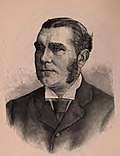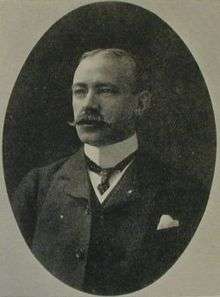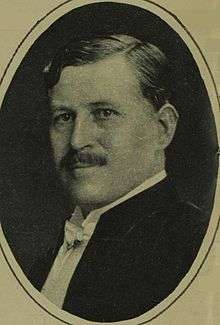Elgin Burghs (UK Parliament constituency)
Elgin Burghs was a district of burghs constituency of the House of Commons of Great Britain from 1708 to 1801 and of the House of Commons of the United Kingdom from 1801 to 1918. Until 1832, when Peterhead was added, the constituency comprised the parliamentary burghs of Elgin, Cullen, Banff, Inverurie and Kintore, lying in Elginshire (later known as Morayshire), Banffshire and Aberdeenshire.
| Elgin Burghs | |
|---|---|
| Former District of burghs constituency for the House of Commons | |
| 1708–1918 | |
| Number of members | One |
| Replaced by | Kincardine and Aberdeenshire East, Banffshire, Moray and Nairn and Kincardine and Aberdeenshire West, |
| Created from | Banff, Cullen, Elgin, Inverurie and Kintore |
Creation
The British parliamentary constituency was created in 1708 following the Acts of Union, 1707 and replaced the former Parliament of Scotland burgh constituencies of Elgin, Banff, Cullen, Inverurie and Kintore.
History
The constituency elected one Member of Parliament (MP) by the first past the post system until the seat was abolished in 1918.[1] [2] [3] [4] [5]
In 1918, Elgin became part of Moray and Nairn, Banff and Cullen part of Banffshire, Inverurie and Kintore part of Kincardine and Aberdeenshire West and Peterhead part of East Aberdeen and Kincardine.
Members of Parliament
Election results
Elections in the 1830s
| Party | Candidate | Votes | % | ||
|---|---|---|---|---|---|
| Tory | Alexander Duff | Unopposed | |||
| Registered electors | c. 84 | ||||
| Tory hold | |||||
| Party | Candidate | Votes | % | ||
|---|---|---|---|---|---|
| Tory | William Gordon-Cumming | Unopposed | |||
| Registered electors | c. 84 | ||||
| Tory hold | |||||
| Party | Candidate | Votes | % | ||
|---|---|---|---|---|---|
| Whig | Andrew Leith Hay | 350 | 50.1 | ||
| Tory | Holt Mackenzie[14] | 225 | 32.2 | ||
| Whig | Alexander Morison[15] | 123 | 17.6 | ||
| Majority | 125 | 17.9 | |||
| Turnout | 698 | 89.9 | |||
| Registered electors | 776 | ||||
| Whig gain from Tory | |||||
Hay was appointed as Clerk of the Ordnance, requiring a by-election.
| Party | Candidate | Votes | % | ||
|---|---|---|---|---|---|
| Whig | Andrew Leith Hay | Unopposed | |||
| Whig hold | |||||
| Party | Candidate | Votes | % | ± | |
|---|---|---|---|---|---|
| Whig | Andrew Leith Hay | 384 | 59.3 | +9.2 | |
| Conservative | William Brodie[16] | 264 | 40.7 | +8.5 | |
| Majority | 120 | 18.5 | +0.6 | ||
| Turnout | 648 | 79.8 | −10.1 | ||
| Registered electors | 812 | ||||
| Whig hold | Swing | +0.4 | |||
Hay was appointed as Clerk of the Ordnance, requiring a by-election.
| Party | Candidate | Votes | % | ||
|---|---|---|---|---|---|
| Whig | Andrew Leith Hay | Unopposed | |||
| Whig hold | |||||
| Party | Candidate | Votes | % | ||
|---|---|---|---|---|---|
| Whig | Andrew Leith Hay | Unopposed | |||
| Registered electors | 858 | ||||
| Whig hold | |||||
Hay resigned after being appointed as Governor of Bermuda, causing a by-election.
| Party | Candidate | Votes | % | ||
|---|---|---|---|---|---|
| Whig | Fox Maule | Unopposed | |||
| Whig hold | |||||
Elections in the 1840s
| Party | Candidate | Votes | % | ± | |
|---|---|---|---|---|---|
| Whig | Andrew Leith Hay | 311 | 51.2 | N/A | |
| Conservative | Thomas Abercromby Duff[17] | 297 | 48.8 | N/A | |
| Majority | 14 | 2.3 | N/A | ||
| Turnout | 608 | 70.9 | N/A | ||
| Registered electors | 857 | ||||
| Whig hold | Swing | N/A | |||
| Party | Candidate | Votes | % | ± | |
|---|---|---|---|---|---|
| Whig | George Skene Duff | 242 | 41.7 | N/A | |
| Conservative | Alexander Bannerman[18] | 192 | 33.0 | −15.8 | |
| Whig | Andrew Leith Hay | 147 | 25.3 | −25.9 | |
| Majority | 50 | 8.6 | +6.3 | ||
| Turnout | 581 | 67.4 | −3.5 | ||
| Registered electors | 862 | ||||
| Whig hold | Swing | N/A | |||
Elections in the 1850s
| Party | Candidate | Votes | % | ± | |
|---|---|---|---|---|---|
| Whig | George Skene Duff | Unopposed | |||
| Registered electors | 988 | ||||
| Whig hold | |||||
| Party | Candidate | Votes | % | ± | |
|---|---|---|---|---|---|
| Whig | George Skene Duff | Unopposed | |||
| Registered electors | 967 | ||||
| Whig hold | |||||
Duff resigned by accepting the office of Steward of the Chiltern Hundreds, causing a by-election.
| Party | Candidate | Votes | % | ± | |
|---|---|---|---|---|---|
| Whig | M. E. Grant Duff | Unopposed | |||
| Whig hold | |||||
| Party | Candidate | Votes | % | ± | |
|---|---|---|---|---|---|
| Liberal | M. E. Grant Duff | Unopposed | |||
| Registered electors | 969 | ||||
| Liberal hold | |||||
Elections in the 1860s
| Party | Candidate | Votes | % | ± | |
|---|---|---|---|---|---|
| Liberal | M. E. Grant Duff | Unopposed | |||
| Registered electors | 1,059 | ||||
| Liberal hold | |||||
| Party | Candidate | Votes | % | ± | |
|---|---|---|---|---|---|
| Liberal | M. E. Grant Duff | Unopposed | |||
| Registered electors | 2,962 | ||||
| Liberal hold | |||||
Elections in the 1870s
| Party | Candidate | Votes | % | ± | |
|---|---|---|---|---|---|
| Liberal | M. E. Grant Duff | Unopposed | |||
| Registered electors | 3,501 | ||||
| Liberal hold | |||||
Elections in the 1880s
| Party | Candidate | Votes | % | ± | |
|---|---|---|---|---|---|
| Liberal | M. E. Grant Duff | 2,082 | 73.2 | N/A | |
| Conservative | James Mackenzie Maclean | 764 | 26.8 | N/A | |
| Majority | 1,318 | 46.3 | N/A | ||
| Turnout | 2,846 | 74.8 | N/A | ||
| Registered electors | 3,806 | ||||
| Liberal hold | Swing | N/A | |||
Duff resigned after being appointed Governor of Madras, causing a by-election.
| Party | Candidate | Votes | % | ± | |
|---|---|---|---|---|---|
| Liberal | Alexander Asher | Unopposed | |||
| Liberal hold | |||||
Asher was appointed as Solicitor General for Scotland, requiring a by-election.
| Party | Candidate | Votes | % | ± | |
|---|---|---|---|---|---|
| Liberal | Alexander Asher | Unopposed | |||
| Liberal hold | |||||
| Party | Candidate | Votes | % | ± | |
|---|---|---|---|---|---|
| Liberal | Alexander Asher | Unopposed | |||
| Liberal hold | |||||
Asher was re-appointed as Solicitor General for Scotland, requiring a by-election.
| Party | Candidate | Votes | % | ± | |
|---|---|---|---|---|---|
| Liberal | Alexander Asher | Unopposed | |||
| Liberal hold | |||||
| Party | Candidate | Votes | % | ± | |
|---|---|---|---|---|---|
| Liberal | Alexander Asher | Unopposed | |||
| Liberal hold | |||||
Elections in the 1890s

| Party | Candidate | Votes | % | ± | |
|---|---|---|---|---|---|
| Liberal | Alexander Asher | 1,668 | 59.7 | N/A | |
| Conservative | James Augustus Grant | 1,127 | 40.3 | N/A | |
| Majority | 541 | 19.4 | N/A | ||
| Turnout | 2,795 | 66.8 | N/A | ||
| Registered electors | 4,182 | ||||
| Liberal hold | Swing | N/A | |||
Asher is appointed Solicitor General for Scotland, requiring a by-election.
| Party | Candidate | Votes | % | ± | |
|---|---|---|---|---|---|
| Liberal | Alexander Asher | Unopposed | |||
| Liberal hold | |||||
| Party | Candidate | Votes | % | ± | |
|---|---|---|---|---|---|
| Liberal | Alexander Asher | 1,853 | 61.5 | +1.8 | |
| Liberal Unionist | Charles Thomas Gordon | 1,161 | 38.5 | −1.8 | |
| Majority | 692 | 23.0 | +3.6 | ||
| Turnout | 3,014 | 67.9 | +1.1 | ||
| Registered electors | 4,440 | ||||
| Liberal hold | Swing | +1.8 | |||
Elections in the 1900s
| Party | Candidate | Votes | % | ± | |
|---|---|---|---|---|---|
| Liberal | Alexander Asher | 1,744 | 59.5 | −2.0 | |
| Conservative | John Moffatt | 1,187 | 40.5 | +2.0 | |
| Majority | 557 | 19.0 | −4.0 | ||
| Turnout | 2,931 | 64.6 | −3.3 | ||
| Registered electors | 4,535 | ||||
| Liberal hold | Swing | −2.0 | |||
| Party | Candidate | Votes | % | ± | |
|---|---|---|---|---|---|
| Liberal | John Sutherland | 2,474 | 70.8 | +11.3 | |
| Conservative | Patrick Rose-Innes | 1,021 | 29.2 | −11.3 | |
| Majority | 1,453 | 41.6 | +22.6 | ||
| Turnout | 3,495 | 73.6 | +9.0 | ||
| Registered electors | 4,748 | ||||
| Liberal hold | Swing | +11.3 | |||
| Party | Candidate | Votes | % | ± | |
|---|---|---|---|---|---|
| Liberal | John Sutherland | 2,742 | 77.7 | +18.2 | |
| Conservative | Evan N B Mackenzie | 786 | 22.3 | −18.2 | |
| Majority | 1,956 | 55.4 | +36.4 | ||
| Turnout | 3,528 | 72.5 | +7.9 | ||
| Registered electors | 4,867 | ||||
| Liberal hold | Swing | +18.2 | |||
Elections in the 1910s

| Party | Candidate | Votes | % | ± | |
|---|---|---|---|---|---|
| Liberal | John Sutherland | 3,031 | 71.6 | -6.1 | |
| Liberal Unionist | William George Black | 1,201 | 28.4 | +6.1 | |
| Majority | 1,830 | 43.2 | -12.2 | ||
| Turnout | 79.8 | ||||
| Liberal hold | Swing | -6.1 | |||
| Party | Candidate | Votes | % | ± | |
|---|---|---|---|---|---|
| Liberal | John Sutherland | Unopposed | |||
| Liberal hold | |||||

| Party | Candidate | Votes | % | ± | |
|---|---|---|---|---|---|
| Liberal | Charles Barrie | Unopposed | |||
| Liberal hold | |||||
See also
References
- "Elgin Burghs". History of Parliament Online (1690–1715). Retrieved 27 March 2019.
- "Elgin Burghs". History of Parliament Online (1715–1754). Retrieved 27 March 2019.
- "Elgin Burghs". History of Parliament Online (1754–1790). Retrieved 27 March 2019.
- "Elgin Burghs". History of Parliament Online (1790–1820). Retrieved 27 March 2019.
- "Elgin Burghs". History of Parliament Online (1820–1832). Retrieved 27 March 2019.
- Leigh Rayment's Historical List of MPs – Constituencies beginning with "E" (part 1)
- Smith, Henry Stooks (1842). The Register of Parliamentary Contested Elections (Second ed.). Simpkin, Marshall & Company. p. 201.
- Churton, Edward (1838). The Assembled Commons or Parliamentary Biographer: 1838. p. 114.
- "Evening Mail". 30 June 1841. pp. 3–4. Retrieved 2 September 2018 – via British Newspaper Archive.
- "Parliament Adjourned". Inverness Courier. 17 December 1857. pp. 4–5. Retrieved 2 September 2018 – via British Newspaper Archive.
- Fisher, David R. "Elgin Burghs". The History of Parliament. Retrieved 7 May 2020.
- Cook, Chris; Stevenson, John (1980). British Historical Facts 1760-1830. Basingstoke: Palgrave. p. 58. doi:10.1007/978-1-137-06465-3. ISBN 978-1-137-06465-3. Retrieved 7 May 2020 – via Google Books.
- Craig, F. W. S., ed. (1977). British Parliamentary Election Results 1832–1885 (e-book)
|format=requires|url=(help) (1st ed.). London: Macmillan Press. ISBN 978-1-349-02349-3. - "Domestic Intelligence". Fife Herald. 10 January 1833. p. 2. Retrieved 7 May 2020 – via British Newspaper Archive.
- "Page 3". Edinburgh Evening Courant. 31 December 1832. p. 3. Retrieved 7 May 2020 – via British Newspaper Archive.
- "Page 2". The Scotsman. 31 December 1834. p. 2. Retrieved 7 May 2020 – via British Newspaper Archive.
- Barrow, John Henry, ed. (1841). The Mirror of Parliament for the First Session of the Fourteenth Parliament of Great Britain and Ireland, in the Fifth Year of the Reign of Queen Victoria, Appointed to Meet August 19. and From Thence Continued Till October 7. 1841. London: Longman, Brown, Green & Longmans; John Murray; and, J. Richards & Co. p. 277.
- "The Elgin Burghs". John o'Groat Journal. 2 July 1847. p. 2. Retrieved 16 August 2019 – via British Newspaper Archive.
- Debrett's House of Commons, 1870
- Debrett's House of Commons and Judicial Bench, 1889
- British Parliamentary Election Results 1885–1918, FWS Craig
- Whitaker's Almanack, 1893
- Debrett's House of Commons and the Judicial Bench, 1901
- The Times, 11 September 1905, p4
- Whitaker's Almanack, 1907
- Debrett's House of Commons and the Judicial Bench, 1916
- The Times, 26 October 1918